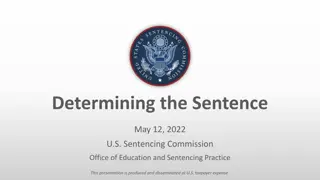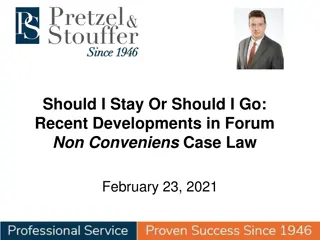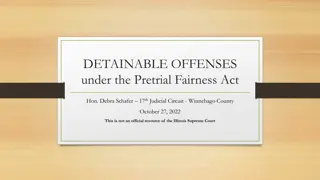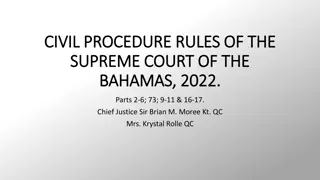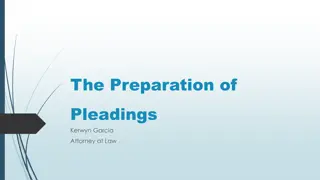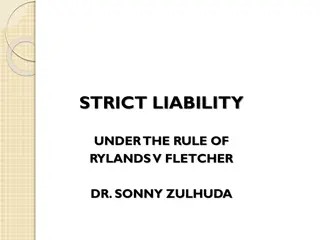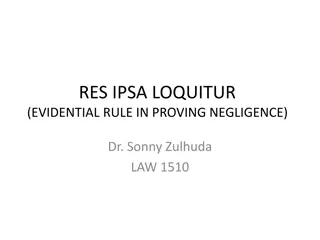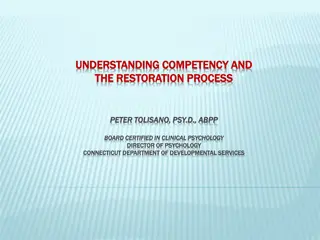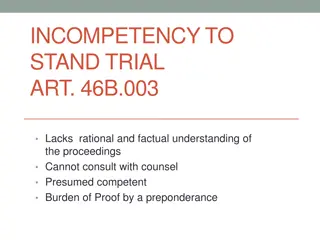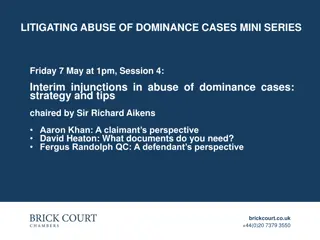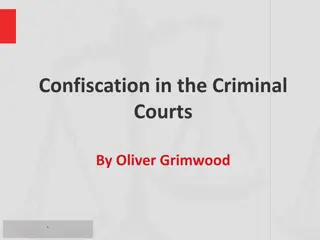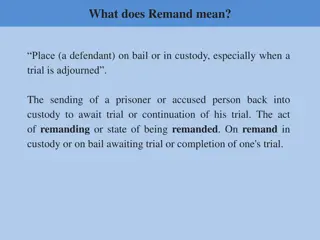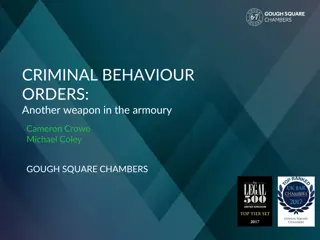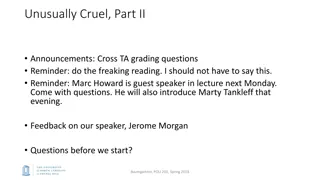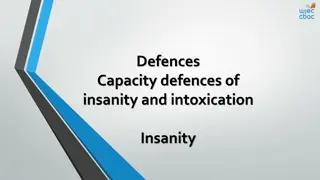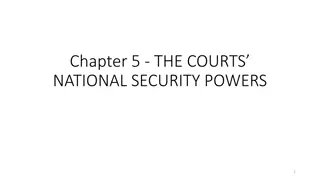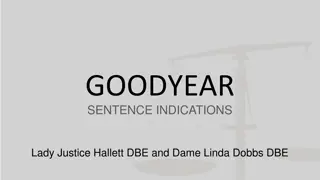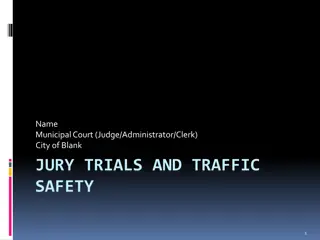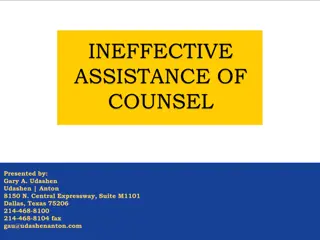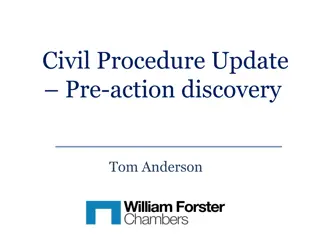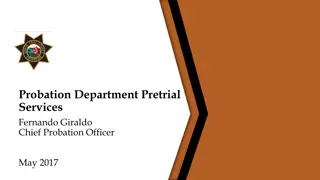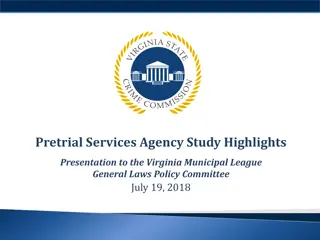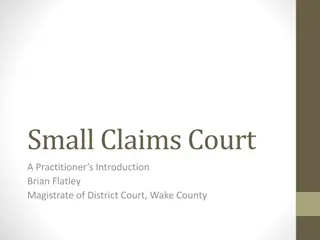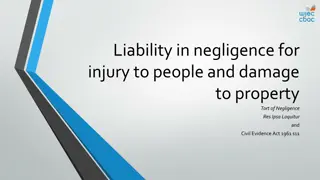Understanding Sentencing Practices and Primary Custody in Legal System
This educational presentation by the U.S. Sentencing Commission Office covers essential concepts such as primary custody, concurrent vs. consecutive sentences, and determining the applicability of departures and variances in sentencing. It also discusses a scenario involving multiple sentences for a
1 views • 31 slides
Recent Developments in Forum Non Conveniens Case Law
Forum non conveniens is an equitable doctrine allowing a court to decline jurisdiction for a trial in a more suitable forum for justice. The plaintiff's choice of forum is crucial, with the burden on the defendant to justify a change. The court assesses various private and public interest factors to
1 views • 29 slides
Competency Evaluation Process: A Comprehensive Overview
This document delves into the process of competency evaluations, specifically focusing on competency restoration and attainment at Utah State Hospital. It covers key steps such as petition, order for evaluation, findings of incompetency, competency restoration treatment, and review. It outlines the
0 views • 41 slides
Guide to Detainable Offenses under the Pretrial Fairness Act
The Pretrial Fairness Act allows for pretrial release for all persons charged with offenses before conviction, except in cases of detainable offenses where dangerousness or willful flight is involved. The state must prove by clear and convincing evidence that the defendant poses a real and present t
1 views • 26 slides
Civil Procedure Rules of the Supreme Court of the Bahamas, 2022 - Acknowledgment of Service
Acknowledgment of Service is a crucial part of civil procedure in the Bahamas, where a defendant disputes a claim or the court's jurisdiction. This process involves responding within a specific timeframe, admitting or disputing parts of the claim, and providing necessary details. Failure to act with
1 views • 17 slides
Key Principles of Pleading in Civil Proceedings
Pleadings in civil proceedings serve the critical purpose of defining issues and providing fair notice to all parties involved. Key rules such as claimant and defendant duties, need for concise statements of facts, and importance of informing parties in advance are emphasized through legal precedent
0 views • 28 slides
Strict Liability under the Rule of Rylands v. Fletcher
Strict liability under the rule of Rylands v. Fletcher establishes that a person who brings something onto their land that is likely to cause harm if it escapes is responsible for any resulting damage, regardless of negligence. The case of Rylands v. Fletcher (1868) set the precedent for this doctri
0 views • 17 slides
Understanding Res Ipsa Loquitur in Proving Negligence
Res Ipsa Loquitur is a legal principle where the occurrence of an accident implies negligence on the part of the defendant. It shifts the burden of proof to the defendant, requiring them to explain the incident's cause. Originating from the Scott v London case in 1865, this principle has been applie
6 views • 19 slides
Understanding Criminal Competency in Legal Proceedings
Competency in criminal cases is crucial for ensuring the accuracy and fairness of legal proceedings. Adjudicative competence, based on standards like the Dusky Standard, relates to a defendant's ability to understand and engage in legal processes. Mistaken beliefs, such as equating clinical disorder
2 views • 12 slides
Understanding Competency to Stand Trial in Criminal Proceedings
Explore the process of determining if a defendant is competent to stand trial, including raising the issue of incompetency, court-ordered evaluations, factors considered by experts, and competency disposition options. The procedures and considerations involved in assessing a defendant's ability to u
0 views • 17 slides
Strategies for Interim Injunctions in Abuse of Dominance Cases
This mini-series event focuses on strategies and tips for interim injunctions in abuse of dominance cases, chaired by Sir Richard Aikens. Various perspectives are explored, including a claimant's viewpoint by Aaron Khan, document requirements by David Heaton, and insights from Fergus Randolph QC as
2 views • 23 slides
Confiscation in the Criminal Courts: A Guide to Proceeds of Crime Law
Confiscation in the criminal courts involves depriving defendants of benefits gained from criminal conduct within their means. The Proceeds of Crime Law in the Cayman Islands sets guidelines for these proceedings, emphasizing that confiscation is not a form of punishment but aims to recover obtained
3 views • 17 slides
Understanding Remand and Detention in Legal Contexts
Remand refers to the act of placing a defendant on bail or in custody, usually during trial proceedings. Detention, on the other hand, involves confinement or imprisonment for a short period, typically for wrongdoing. Remand homes are British institutions for juvenile offenders awaiting trial or tem
0 views • 4 slides
Understanding Criminal Behaviour Orders: An Overview and Legal Requirements
Criminal Behaviour Orders (CBOs) are issued following conviction for criminal offences to tackle serious and persistent anti-social behavior. This talk provides an overview of CBOs, legal requirements, when they are appropriate, and practical tips for implementation. The orders can prohibit or requi
0 views • 12 slides
Understanding Murder in Common Law
Murder, as defined in common law, is the unlawful killing of a human being with malice aforethought. This act involves both actus reus (unlawful killing caused by the defendant) and mens rea (intention to kill or cause grievous bodily harm). Legal causation, including thin skull test, chain of causa
0 views • 18 slides
Criminal Justice Sentencing and Drug Policies in Baumgartner's POLI 203 Course
Announcements include upcoming guest speakers and reminders. Discussions cover motivated reasoning, victim focus versus defendant focus, and appropriate sentences for various crimes. The historical forms of sentencing in the US are explored, along with drug sentencing policies in Portugal post-dicta
0 views • 8 slides
Legal Defences of Insanity and Intoxication
The legal defences of insanity and intoxication play a crucial role in cases where individuals may not be fully accountable for their actions. The M'Naghten Rules, devised following the famous case of Daniel M'Naghten, provide guidelines for determining insanity. It's essential for the defendant to
0 views • 12 slides
National Security Powers and Basic Standing in Court Cases
In national security cases, the principle of basic standing remains applicable, requiring individuals to have suffered a genuine injury directly linked to the actions of the defendant. This ensures that only those with a valid legal interest can bring cases before the courts.
0 views • 84 slides
Brady v. Maryland: The Case of Prosecutorial Misconduct
Brady v. Maryland was a landmark case where the defendant, Mr. Brady, was convicted of murder and sentenced to death. The case revolved around the prosecution's failure to disclose exculpatory evidence, violating Mr. Brady's due process rights. The Supreme Court held that prosecutors must share favo
0 views • 32 slides
Comparative Analysis of Plea Bargaining in Criminal Justice Systems
Research by Dr. Dorota Czerwinska delves into the practice of plea bargaining, examining its roots, benefits, and ethical considerations in various countries such as the USA, England, France, Germany, Italy, and Poland. The study explores the reasons behind the development of plea bargaining and que
0 views • 27 slides
Guidelines on Seeking Sentence Indications in Legal Proceedings
In the case of Goodyear, it was established that judges may provide an indication of the likely maximum sentence if the defendant pleads guilty. The process should be initiated by the defense advocate or defendant with written instructions and clarity on the plea basis. Precautions include avoiding
0 views • 9 slides
Understanding Municipal Courts and Traffic Laws
Explore the functions of a Municipal Court, the role of a Municipal Judge, jurisdiction over criminal misdemeanors and traffic offenses, importance of enforcing traffic laws, defendant's options in a trial, the right to a jury trial, and the concept of impartiality in legal proceedings.
0 views • 21 slides
Overview of Strickland v. Washington and Ineffective Assistance of Counsel
Strickland v. Washington establishes a two-part test for determining ineffective assistance of counsel. The test requires a showing of deficient performance and resulting prejudice to the defendant. Appellate courts must presume counsel's conduct was reasonable unless proven otherwise. Challenges to
0 views • 42 slides
Pre-action Discovery in Civil Procedure: NT Supreme Court Rules
Pre-action discovery allows a party to obtain information from a potential defendant or non-party before commencing formal legal proceedings. The NT Supreme Court Rules Order 32 outline the procedures for pre-action discovery, including when there is reasonable cause to believe that relief may be ob
0 views • 13 slides
Santa Cruz County Probation Department Pretrial Services Overview
The Santa Cruz County Probation Department emphasizes public safety, evidence-based practices, and efficient use of jail space through pretrial services. By implementing actuarial risk tools, providing tailored supervision, and utilizing evidence-based techniques, they aim to reduce pretrial detenti
0 views • 22 slides
Understanding Bail Bonds, Surety Bonds, and Their Differences
Bail bonds and surety bonds are legal mechanisms used to secure a defendant's release from custody before trial. Bail involves the payment of a set amount to ensure the defendant's appearance in court, while surety bonds involve a third party guaranteeing the defendant's attendance. The article expl
0 views • 6 slides
Virginia State Crime Commission Pretrial Services Study Highlights
The Virginia State Crime Commission has conducted a comprehensive study on pretrial services agencies, focusing on the statutory mission and the pretrial process. The study examined the use of pretrial services supervision for defendants, indigent defendant placement, fees associated with supervisio
0 views • 31 slides
Rights and Procedures in Criminal Trials
Explore the key elements of a criminal trial process, including plea bargains, right to jury trial, speedy trial, confronting witnesses, and freedom from self-incrimination. Learn about the defendant's options in case of wrongful conviction and the sentencing procedures undertaken by judges.
0 views • 9 slides
Presumption of Innocence in EU Directive 2016/343 Explained
This article delves into the essential aspects of the presumption of innocence as outlined in EU Directive 2016/343. It covers the scope of application, burden of proof, right to silence, and other related provisions. The text emphasizes the significance of treating individuals as innocent until pro
0 views • 14 slides
Understanding Small Claims Court in North Carolina
Small Claims Court in North Carolina is a court of limited jurisdiction suited for matters involving modest amounts of money. This court welcomes attorneys, making it accessible for individuals seeking resolution. The maximum amount one can claim is $5000, with specific exceptions. Cases must be fil
0 views • 32 slides
Understanding Res Ipsa Loquitur in Negligence Law
Res Ipsa Loquitur is a legal principle where the occurrence of an accident implies negligence by the defendant. This doctrine creates a presumption of fault against the defendant, who must then offer an explanation to rebut this presumption. The case of Scott v. The London and St. Katherine Docks Co
0 views • 15 slides
